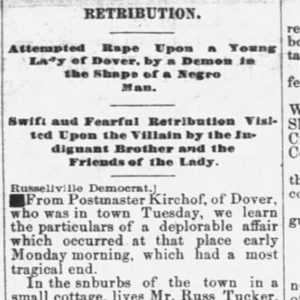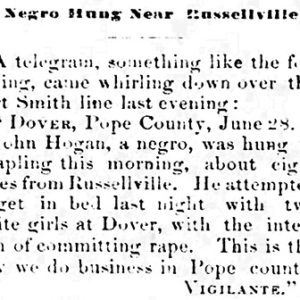calsfoundation@cals.org
John Hogan (Lynching of)
On June 28, 1875, an African American named John Hogan was lynched near Russellville (Pope County) for allegedly attempting to assault one of Russ Tucker’s daughters.
Public records provide some information about the lynching victim. The 1870 census (five years before the incident) lists a twelve-year-old African American named John Hogan, who was living on the farm of a twenty-two-year-old white man named Reece B. Hogans. Hogans had a wife, Josephine, and a two-year-old daughter. Also living on the farm was another black laborer, fifteen-year-old Rose Hogan, who may have been John Hogan’s sister. If this is the correct John Hogan, he would have been only seventeen when he was lynched.
Russ Tucker was probably David Russell Tucker, who in 1860 was living in his wife, Sarah, and children in Dover (Pope County). In 1870, the family was living in Newton County, but when his wife died in 1877, they were back in Dover. According to the 1870 census, the Tuckers’ household included two sons, eighteen-year-old Andrew and thirteen-year-old James, along with daughters Martha, age twelve, and Margaret, age eight. As daughter Mandosia (Dosy) had married in 1870 and was presumably not living in the house, the victim of the alleged assault was probably Martha, who would have been seventeen at the time of the reported attack. By 1880, the Tucker family had moved to Giles County, Tennessee, but when Russ Tucker died in 1883, he was once again living in Dover.
Hogan’s lynching was first mentioned in the Arkansas Gazette on June 29, 1875. The Gazette had received a telegram sent from Dover on June 28, from a person who identified himself as “Vigilante.” According to his account, Hogan had “attempted to get in bed last night with two white girls at Dover, with the intention of committing rape.” On the morning of the June 28, a mob took Hogan and took him about eight miles from Russellville, where they hanged him. According to “Vigilante”: “This is the way we do business in Pope county.”
On July 2, the Gazette published more details about the incident. At 4:00 on the morning of June 28, Russ Tucker and his son were awakened by screams from one of his daughters. They rushed to the girls’ room, and there found “a negro man of notoriously bad character.” The “demon” had allegedly “attempted to offer violence to the person of one of the daughters.” When Tucker entered the room, Hogan fled but was pursued by Tucker and neighbors that he had enlisted along the way. Hogan was soon captured. The crowd got a rope, took Hogan to the woods outside of town, and hanged him. The Gazette stated that “after a few struggles, the life of the reckless, desperate man was ended.” According to the Gazette, Hogan, an “abandoned wretch” with “brutish propensities,” had attempted such attacks on three previous occasions. The following morning, the community was quiet, with few knowing what had occurred even though the members of the mob made no attempt to disguise their identities. Coroner John Pace Langford held an inquest into Hogan’s death and found that “the deceased came to his death by hanging by the neck with a rope, and at the hands of H. H. Poynter, Anderson Morgan and J. Tucker.” H. H. Poynter may in fact be W.H. Poynter, who married Dosy Tucker in 1870. In 1880, twenty-five-year-old Anderson Morgan was living in Dover with his wife, Betsey, and their two young sons. J. Tucker is Russ Tucker’s son James, who by this time would have been eighteen.
The Gazette noted, “While the whole community feel relieved and breathe easier at being freed from the presence of such a lustful, daring character as was John Hogan, and, while everybody agrees that he richly merited the punishment he received, there is a feeling of the most profound and almost universal regret at the manner in which his punishment was meted out, and there is no doubt had some of the older and more cool-headed citizens of Dover been cognizant of the transaction in time, they would have prohibited the young men from committing the rash and grave act of taking the law into their own hands.”
For additional information:
“Lynch Law: A Negro Hung near Russellville.” Arkansas Gazette, June 29, 1875, p. 4.
“Retribution.” Arkansas Gazette, July 2, 1875, p. 4.
Nancy Snell Griffith
Davidson, North Carolina
 Civil Rights and Social Change
Civil Rights and Social Change Post-Reconstruction through the Gilded Age, 1875 through 1900
Post-Reconstruction through the Gilded Age, 1875 through 1900 John Hogan Lynching Article
John Hogan Lynching Article  John Hogan Lynching Article
John Hogan Lynching Article 




Comments
No comments on this entry yet.